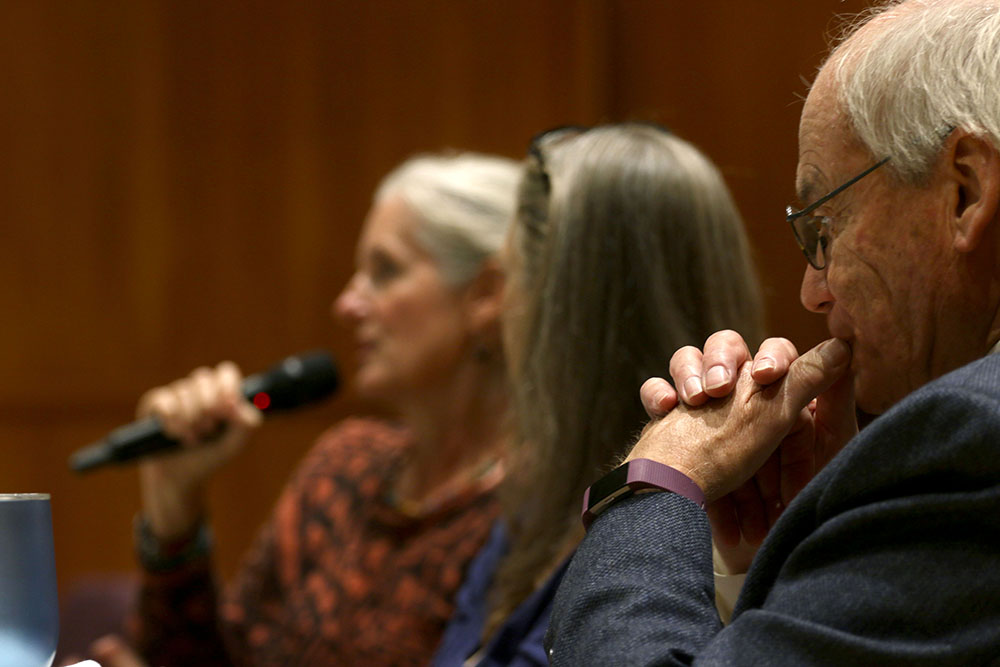Campus hosts a panel for the community

Anyssa Logan | Co-Executive Editor | alogan@mail.smct.edu
St. Michael’s hosted a panel, “Perspectives on the Dobb’s decision overturning Roe v. Wade,” in McCarthy Hall on Wednesday Sept. 28. The Supreme Courts conclusion on Dobbs v. Jackson Women’s Health Organization, also known as the Dobb’s decision, made the access to abortion and other reproductive rights no longer protected federally, instead leaving it up to states. The panelists were Kathy Butts, director of Personal Counseling & assistant director of Bergeron Wellness Center, Patricia Siplon, professor of Political Science and Public Health, and Edward Mahoney, professor emeritus of Religious Studies. The panel was moderated by Jeff Trombower, Vice President of Academic Affairs. Though the panel was set to run for an hour and 15 minutes, conversations instead ran for almost 2 hours.
The panelists answered questions from both Trumbower and the audience. To start the panel, each speaker had 10 minutes to share their thoughts and facts about the Dobb’s decision. After each speaker’s 10 minutes were up, the conversation was opened to the audience.
Butts focused on the mental health aspects of the decision, explaining the effects the Dobb’s decision has and will have on the mental health. “The Dobb’s decision already has and will continue to have negative effects on mental health,” Butts said. “You cannot take away basic human rights of half the population and expect that there will not be an impact on overall mental health.”
Mahoney added emphasis on the complexity of the topic, the impact of politics and how polarized the decision has become. “We try to not reduce issues to simple binaries, but rather invite all participants to broaden and enrich the conversations in order to allow genuine learning to happen,” Mahoney said after the panel. “The panel is an opportunity to demonstrate that as a Catholic institution, we respect academic freedom and open inquiry.”
Panels like this are very important because they create a space where viewpoints can be shared and debated in a healthy way
Grace Saunders ’24
Siplon discussed this topic using a lens of public health and equity. She discussed the friend of the court brief that was written to the Supreme Court by 547 deans and chairs of public health departments and the American Public Health Foundation, explaining the main points that were made in the 164 page document. The document’s main points were on the essential components to a healthy pregnancy, childcare, poverty, how this can affect a pregnancy and the different impacts a state restriction can create.
One of the questions that was asked by an audience member was about prevention of abortions and harm reduction. “I would argue that we haven’t gone as far as we need to in contraceptive research,” said Siplon when answering at the panel. “ If we can find contraceptives that are extremely close to 100% effective we may be able to massively decrease the need for abortions.”
Grace Saunder ’24 attended the panel, wanting to hear the different perspectives from her community. “Panels like this are very important because they create a space where viewpoints can be shared and debated in a healthy way,” said Saunders.
This discussion is not only occuring within the St. Michaels community and is currently a conversation across the country as states decide whether abortion access should be protected.
As of Oct. 7, The New York Times reports 16 states have the right and access protected by law. Eighteen states have enacted a full ban or a partial ban. Judges across 9 states have blocked pieces of bans or the complete ban, trying to determine if there should be exceptions.
Vermont plans to protect the right and access to abortion. In 2019, Vermont passed Title 18, protecting reproductive health within the state. The title states that “a public entity as defined in section 9496 of this title shall not, in the regulation or provision of benefits, facilities, services, or information, deny or interfere with an individual’s fundamental rights to choose or refuse contraception or sterilization or to choose to carry a pregnancy to term, to give birth to a child, or to obtain an abortion.”
While Title 18 is currently active within Vermont, the state legislature has planned for years to officially add this protection to the state constitution as well. This amendment is like a safety harness, helping to prevent future state legislatures from trying to pass bills against abortion access in Vermont. Proposal 5 will be in the upcoming general election on Nov. 8 and Vermont citizens get the chance to vote on adding Proposal 5 Title 22, protecting the freedom to reproductive rights, to the state constitution.
Every four years, amendments can be added to the state constitution after a majority vote in the senate and the house. The citizens then get to vote, deciding if it will be added to the constitution.
Proposal 5 does not explicitly use the word “abortion.” Instead it mentions “reproductive rights.” This allows the constitutional protection to cover access to both abortion and contraception.
California is also voting in November to add a similar amendment to their state constitution. The official proposal states, “Proposition 1 would change the California Constitution to expressly include existing rights to reproductive freedom.” This proposal is directly linked to Dobbs v. Jackson Women’s Health Organization decision. Prior to this proposition, California had a law protecting abortion access, however, the state decided that was not enough due to the worry of future legislation wanting to pass a ban.
This discussion will not be over any time soon as more states move towards protection and others start to pass restrictions and bans.
“This panel is important on campus because we are an educational institution and we should be talking about major societal issues, as well as major Supreme Court decisions that impact all of our lives,” said Butts.

